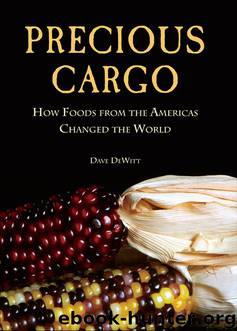Precious Cargo by David Dewitt

Author:David Dewitt [DeWitt, David]
Language: eng
Format: epub
ISBN: 9781619023888
Publisher: Counterpoint
Ever curious, Conneau inspected every stew he was served and was constantly surprised that no provider of needed protein was ignored in West Africa. “Many a time, when I was as hungry as a wolf, I found my vagabonds in a nook of the woods,” he wrote, “luxuriating over a mess with the unctuous lips of aldermen; but when I came to analyze the stew, I generally found it to consist of a ‘witch’s cauldron’ copiously filled with snails, lizards, iguanas, frogs, and alligators!” Usually, when he was quite hungry, he postponed his inspection until he had eaten his fill. “A long fast is a good sauce,” he wrote philosophically, “and I need not assert that I started sans façon [unceremoniously]. My appetite was sharp, and the vapour of the liquid inviting . . . spoonful after spoonful was sucked in as rapidly as the heat allowed.” Conneau asks for a second helping, and “[a]s the captain was helping me to the second ladle, he politely demanded whether I was ‘fond of the thick;’ and as I replied in the affirmative, he made another dive to the bottom and brought up the instrument with a heaping mass, in whose centre was a diminutive skull of an animal.”
Even though English was not his first language—his childhood was spent in Italy—Conneau has a nice turn of phrase. In one example, he describes a particularly meager meal as “simple enough even for the most dyspeptic homoeopathist.” A homoeopathist, defined by satirist Ambrose Bierce in The Devil’s Dictionary as “the humorist of the medical profession,” is one who believes that minute amounts of drugs can be administered as cures. A dyspeptic one is a person who suffers from indigestion, so what Conneau means in 1827 is that there was a small amount of very bland food. But most of the time, the food was quite spicy and he makes many comments about how “peppered” the food was, and on one occasion he tried some “stewed fowls, boiled to rags with rice, and seasoned with delicious ‘palavra’ sauce.” I discuss that particular sauce in the chile pepper sections of this chapter, below.
There’s a very simple reason stews are so popular in African cooking: The meats “seem to come from animals that have been trained all their lives as long-distance runners,” in the words of African food expert Laurens van der Post. “Even chicken is rarely tender enough for roasting or grilling straightaway,” he adds, so the meats need to be “boiled to rags” as Conneau put it, or minced into casseroles or highly marinated, as they are in Senegal. That’s yassa-style cooking, with lemon-based, onion-chile pepper marinades for fish, fowl, or meat.
Many of the stews contained peanuts, of course called “groundnuts” there, and Conneau waxed rhapsodic over a particular one he encountered often: “The savory steam of a rich stew with a creamy sauce saluted my nostrils, and, without asking leave, I plunged my spoon into a dish that stood before my entertainers, and seemed prepared exclusively for themselves.
Download
This site does not store any files on its server. We only index and link to content provided by other sites. Please contact the content providers to delete copyright contents if any and email us, we'll remove relevant links or contents immediately.
| Culinary Biographies | Essays |
| Food Industry | History |
| Reference |
For the Love of Europe by Rick Steves(3672)
The Sprouting Book by Ann Wigmore(3069)
BraveTart by Stella Parks(2987)
Better Homes and Gardens New Cookbook by Better Homes & Gardens(2979)
The Death of the Heart by Elizabeth Bowen(2921)
Salt, Fat, Acid, Heat: Mastering the Elements of Good Cooking by Nosrat Samin(2671)
Sauces by James Peterson(2603)
Classic by Mary Berry(2517)
Solo Food by Janneke Vreugdenhil(2502)
The Bread Bible by Rose Levy Beranbaum(2491)
Ottolenghi - The Cookbook by Yotam Ottolenghi(2372)
Martha Stewart's Baking Handbook by Martha Stewart(2347)
Kitchen confidential by Anthony Bourdain(2333)
Betty Crocker's Good and Easy Cook Book by Betty Crocker(2293)
Day by Elie Wiesel(2257)
Hot Sauce Nation by Denver Nicks(2116)
The Plant Paradox by Dr. Steven R. Gundry M.D(2060)
My Pantry by Alice Waters(2056)
The Kitchen Counter Cooking School by Kathleen Flinn(2021)
